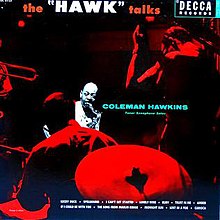
Coleman Randolph Hawkins, nicknamed "Hawk" and sometimes "Bean", was an American jazz tenor saxophonist. One of the first prominent jazz musicians on his instrument, as Joachim E. Berendt explained: "there were some tenor players before him, but the instrument was not an acknowledged jazz horn". Hawkins biographer John Chilton described the prevalent styles of tenor saxophone solos prior to Hawkins as "mooing" and "rubbery belches." Hawkins cited as influences Happy Caldwell, Stump Evans, and Prince Robinson, although he was the first to tailor his method of improvisation to the saxophone rather than imitate the techniques of the clarinet. Hawkins' virtuosic, arpeggiated approach to improvisation, with his characteristic rich, emotional, and vibrato-laden tonal style, was the main influence on a generation of tenor players that included Chu Berry, Charlie Barnet, Tex Beneke, Ben Webster, Vido Musso, Herschel Evans, Buddy Tate, and Don Byas, and through them the later tenormen, Arnett Cobb, Illinois Jacquet, Flip Phillips, Ike Quebec, Al Sears, Paul Gonsalves, and Lucky Thompson. While Hawkins became known with swing music during the big band era, he had a role in the development of bebop in the 1940s.

Digital III at Montreux is a 1979 live album featuring a compilation of performances by Ella Fitzgerald, Count Basie, Niels-Henning Ørsted Pedersen, Joe Pass, and Ray Brown, recorded at the 1979 Montreux Jazz Festival. It was produced and has liner notes by Norman Granz. The cover photo is by Phil Stern.

More Blues and the Abstract Truth is an album by American jazz composer, conductor and arranger Oliver Nelson featuring performances recorded in 1964 for the Impulse! label.

The Greatest Jazz Concert in the World is a 1967 live album featuring Duke Ellington and his orchestra, Ella Fitzgerald, Oscar Peterson, T-Bone Walker, Coleman Hawkins, Clark Terry and Zoot Sims. It was released in 1975.
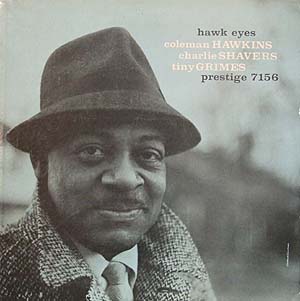
Hawk Eyes is an album by saxophonist Coleman Hawkins which was recorded in 1959 and released on the Prestige label.

Breakfast Dance and Barbecue is a live album by pianist, composer and bandleader Count Basie and his Orchestra with vocalist Joe Williams featuring tracks recorded at a Disc Jockey convention in Florida in 1959 and originally released on the Roulette label.

Dance Session is an album by pianist/bandleader Count Basie recorded in 1953 and became Basie's first 12-inch LP when it was originally released on the Clef label. Selections from this album were also released on the 1956 Clef LPs Basie Roars Again and King of Swing.
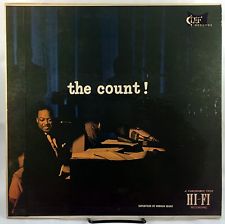
The Count! is an album by pianist/bandleader Count Basie recorded in 1952 and released on the Clef label in 1955.
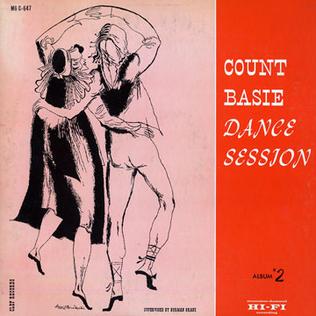
Dance Session Album #2 is an album by pianist/bandleader Count Basie recorded in 1954 and originally released on the Clef label. Selections from this album were also released on the 1956 Clef LPs Basie Roars Again and King of Swing.
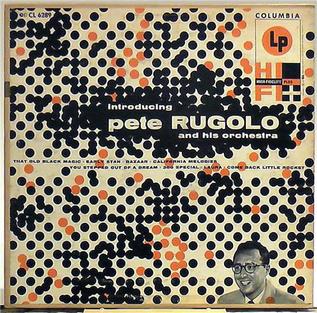
Introducing Pete Rugolo is an album by bandleader, composer, arranger and conductor Pete Rugolo featuring performances recorded in 1954 and released on the Columbia label, initially as a 10-inch LP, then with an additional four tracks as a 12-inch LP in 1955.

All the Cats Join In is a song written by Ray Gilbert, Eddie Sauter and Alec Wilder, and first recorded by Benny Goodman. It later was a track on an LP with the same title by trumpeter Buck Clayton.

The High and Mighty Hawk is an album by saxophonist Coleman Hawkinsthat which was recorded in 1958 and released on the Felsted label.
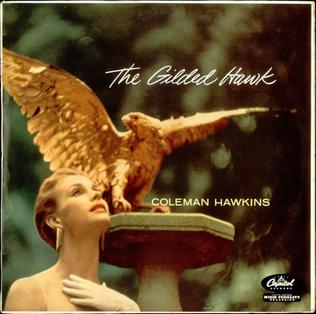
The Gilded Hawk is an album by saxophonist Coleman Hawkins with an orchestra arranged and conducted by Glenn Osser which was recorded in late 1956 and early 1957 and released on the Capitol label.

The Hawk in Paris is an album by saxophonist Coleman Hawkins featuring compositions related to Paris performed with an orchestra arranged and conducted by Manny Albam which was recorded in 1956 for the RCA Records subsidiary Vik label.
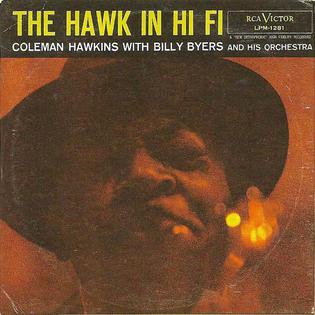
The Hawk in Hi Fi is an album by saxophonist Coleman Hawkins with an orchestra arranged and conducted by Billy Byers. It was recorded in early 1956 and released on the RCA Victor label.
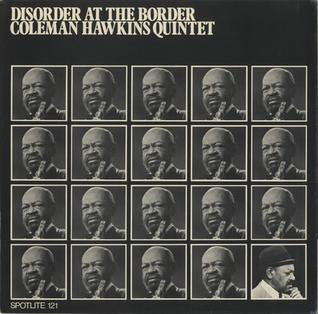
Disorder at the Border is a live album by saxophonist Coleman Hawkins compiling tracks which were originally broadcast in 1952 and first released on LP in 1973 on the UK Spotlite label.

The Saxophone Section, is an album by saxophonist Coleman Hawkins which was recorded in 1958 and released on the World Wide label.

Things Ain't What They Used to Be is an album by the First Annual Prestige Swing Festival featuring two all-star groups, one including Coleman Hawkins, Hilton Jefferson, Jimmy Hamilton and Joe Newman and the other led by Al Sears with Buddy Tate, Pee Wee Russell and Joe Thomas which was recorded in 1961 and first released on the Swingville label as a double album before being reissued as two single discs with Hawkins name prominently displayed; Things Ain't What They Used to Be and Years Ago. All tracks were also reissued as Jam Session in Swingville which was credited to Hawkins and Russell.

Rainbow Mist is an album by the American jazz saxophonist Coleman Hawkins compiling recordings from 1944 originally released by Apollo Records that was released by the Delmark label in 1992.
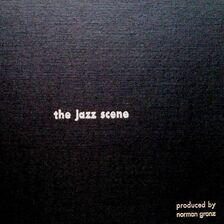
The Jazz Scene is a 1949 compilation album edited by Norman Granz, featuring recordings from Ralph Burns, Duke Ellington, George Handy, Coleman Hawkins, Neal Hefti, Machito, Charlie Parker, Flip Phillips, Bud Powell, Willie Smith, Billy Strayhorn and Lester Young.
